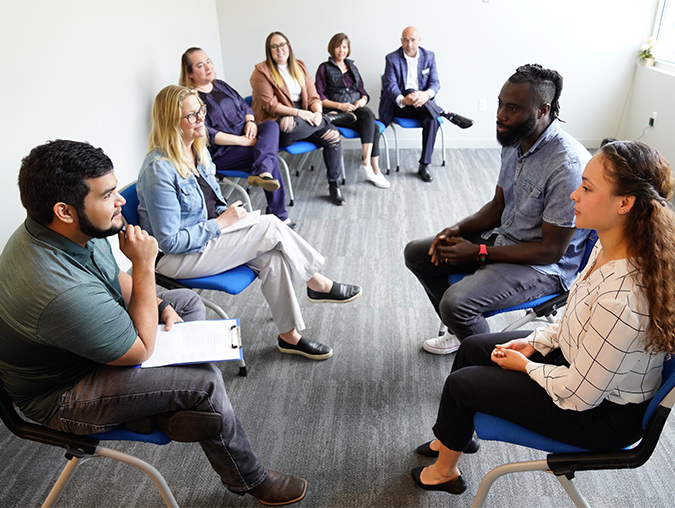Marriage and Family Therapy (MFT Degree)
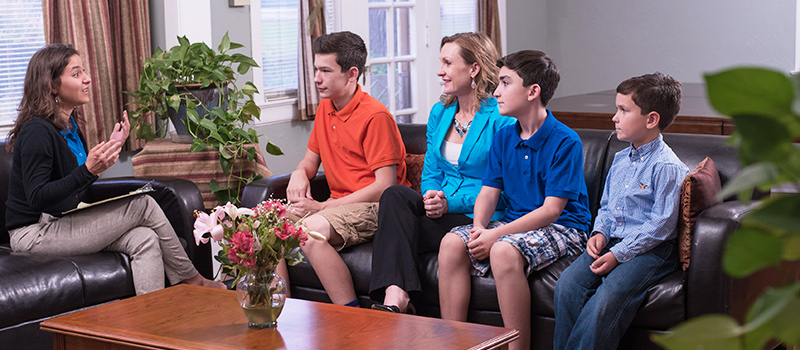
Get started on your Journey
Marriage and Family Therapy (MFT) Program Overview
The Master of Science degree in Psychology with a concentration in Marriage and Family Therapy (MFT) at Our Lady of the Lake University (OLLU) prepares practitioners to assist with mental health concerns in family and social contexts using relational strengths-based approaches to psychotherapy.
In coursework and practice, students learn to work with clients from a wide variety of ethnic, economic, educational and religious backgrounds and develop proficiency in providing psychotherapy services to individuals, couples, families and groups.
The MFT program prepares culturally competent mental health professionals through a program focused on:
- Cultural and Linguistic Competence
A hallmark of our program is its emphasis on cultural as well as linguistic diversity. Our focus on cultural diversity evolved as a consequence of the university’s location in a predominately low-income, Mexican American neighborhood, OLLU’s status as a Hispanic Serving Institution, and the long-standing commitment by the program’s faculty members to infuse this focus at all levels of the program. - Applied Knowledge and Skills
The practitioner focus of our program begins with students participating on practicum teams at the university’s training clinic; under the supervision of a faculty member, student teams provide psychotherapy services to clients at the clinic. Students also complete a portion of their practicum hours at approved off-campus sites.
Licensure
The program meets the academic requirements for licensure as a Marriage and Family Therapist (LMFT) through the Texas State Board of Examiners of Marriage and Family Therapists, and licensure as a Professional Counselor (LPC) through the Texas State Board of Examiners of Professional Counselors.
Program Design
Courses in the MFT program are offered in the evenings. The program brings together students from the San Antonio and Rio Grande Valley campuses through the use of technology to provide them with a collaborative learning experience. Students will attend courses synchronously via videoconference and work with colleagues from each campus on group assignments. This collaboration allows students to build their professional network.
The 60-credit hour program can be completed in two years for a student attending classes full time during the fall, spring and summer semesters.
Accreditation
The San Antonio Master of Science in Psychology with a concentration in Marriage and Family Therapy has been accredited by the Commission on Accreditation for Marriage and Family Therapy Education (COAMFTE) of the American Association for Marriage and Family Therapy (AAMFT) . The COAMFTE is responsible for establishing standards for competence in clinical education for the profession of marriage and family therapy, and for the review and recognition of programs successfully meeting these standards.
OLLU is one of only a few universities in Texas with a COAMFTE accredited master’s program. COAMFTE accreditation also allows graduates to seek employment as Marriage and Family Therapists within the federal government.
Program Benefits
COAMFTE Accredited
Practitioner Focused
University-Based Clinic
Why Earn a Marriage and Family Therapy Degree?
Getting a MFT degree from Our Lady of the Lake University offers numerous benefits, especially for students passionate about pursuing a career in this field. The Master of Science degree in Psychology with a concentration in Marriage and Family Therapy (MFT) is a comprehensive program designed to equip future practitioners with the necessary skills and knowledge to assist individuals and families with mental health concerns within diverse social contexts. Here's why opting for an MFT degree can be an excellent choice for students:
Flexibility Tailored to You
At our university, we understand that our students have diverse life commitments.
That's why our MFT program offers evening classes allowing you to balance your studies
with your other responsibilities.
Access to a Diverse Learning Community
One of the strengths of our program is the opportunity to interact with a wide range
of peers on our San Antonio, Houston and Rio Grande Valley campuses. Our students
come from various backgrounds, including ethnicities, economic statuses, and religious
affiliations. This diverse learning environment enriches your education and equips
you to work effectively with clients from diverse backgrounds.
Emphasis on Relational Strengths-Based Approaches
Our MFT program places a strong emphasis on relational strengths-based approaches
to psychotherapy. As a student at our university, you'll learn how to harness the
inherent strengths within individuals, couples, families, and groups to promote mental
health and well-being. This approach aligns with contemporary therapeutic practices
and prepares you for real-world challenges.
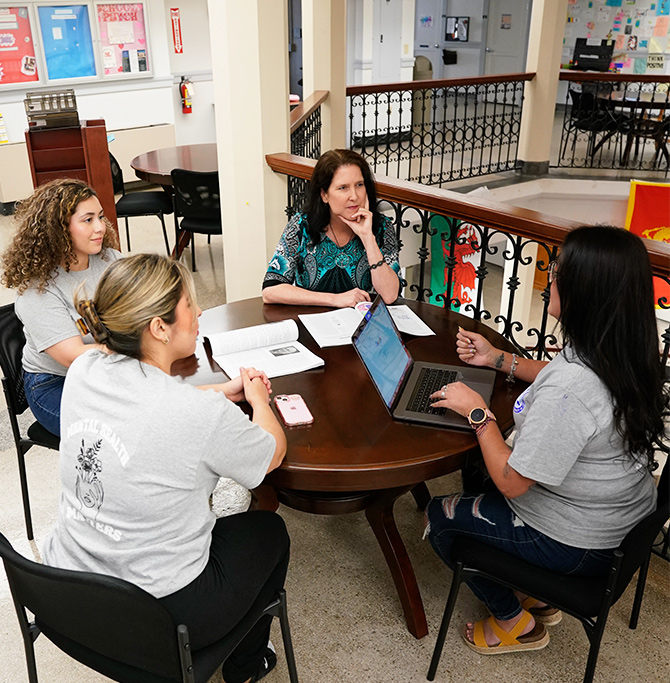 What Will You Learn in Our Marriage and Family Therapist Degree?
What Will You Learn in Our Marriage and Family Therapist Degree?
Our MFT program focuses on preparing practitioners to address mental health concerns
within the context of families, couples, and individuals, all while utilizing strengths-based
approaches to psychotherapy.
We understand the importance of meeting the academic requirements for licensure, and our program aligns with the Texas State Board of Examiners of Marriage and Family Therapists, as well as licensure as Professional Counselors through the Texas State Board of Examiners of Professional Counselors.
This is what our students can expect to learn in this program:
- Research Design and Procedures (PSYC 6380)
- Psychopathology: Etiology, Diagnosis, and Treatment Planning (PSYC 7333)
- Life Span Developmental Psychology (PSYC 7351)
- Group and Family Processes (PSYC 8301)
- Professional Practice: Skills and Issues (PSYC 8303)
- Theoretical Foundations of Psychotherapy (PSYC 8345)
- Strengths-based Approaches to Contemporary Issues (PSYC 8348)
- Introduction to Systemic Approaches to Psychotherapy (PSYC 8351)
- Pre-practicum Psychotherapy Laboratory: Basic Interviewing Skills (PSYC 8352)
- Psychotherapy with Children Adolescents and Their Families (PSYC 8355)
- Family Processes Across Cultures (PSYC 8356)
- Advanced Systemic Approaches to Psychotherapy (PSYC 8357)
- Couples and Sex Therapy (PSYC 8359)
- Practicum I, II, III, and IV (PSYC 8190, 8390, 8391, 8392, 8393)
Is an MFT Degree Worth It?
The MFT degree program our university offers is specifically tailored to prepare our students for highly rewarding careers with excellent salary potential and promising job outlooks. Pursuing this degree is an investment in a bright future.
One of the key factors that make pursuing this degree worthwhile is the potential for high salaries. By enrolling in our program, you are setting yourself up for a career with competitive earning potential, reaching up to $98,700. The field is projected to grow by 15% from 2022 to 2032, much faster than the average for all occupations. Our university's commitment to providing a quality education ensures you are well-prepared to secure positions with attractive compensation packages
Program Focus
Cultural Competence Focus
The MFT program mission is to prepare culturally competent professionals who are skilled in providing psychotherapeutic services to a diverse community and that have a deep and abiding respect for individual and cultural diversity, has long been one of its greatest strengths. A hallmark of our program is its emphasis on cultural as well as linguistic diversity. Our focus on cultural diversity evolved as a consequence of the university’s location in a predominately low-income, Mexican American neighborhood, OLLU’s status as a Hispanic Serving Institution, and the long-standing commitment by the program’s faculty members to infuse this focus at all levels of the program.
Practitioner Focus
Faculty members focus on designing classroom experiences that are relevant to the practice of systemic psychotherapy. Students are required to apply their knowledge in several courses that have a practical component. Thus, many courses go beyond awareness and knowledge and focus on skill development. Students begin their practicum training after completing a minimum of 18 hours of specified courses. Full-time students generally begin practicum in the summer of their first year. This experience begins with clinical teams at the Psychology Department’s training clinic, the Community Counseling Service (CCS). The team approach provides a supportive environment. Up to six students and a faculty supervisor meet weekly as a team to deliver psychotherapy services. After the first semester, and with the approval of their supervisors, students may complete a portion of their required practicum hours at approved off-campus sites. Students are required to obtain a minimum of 500 hours of supervised, direct delivery of services.
Students in the MFT concentration are taught a variety of theories and professional skills. However, the program emphasizes a particular set of systemic therapy models. These models are described in various ways, such as: Relational Strengths-based, Postmodern, and Social Constructionist. While there are variations among these collaborative models, all of them have in common:
- An emphasis on each person’s strengths, resources and unique perspectives.
- An emphasis on a non-pathological view with skepticism regarding the usefulness of psychiatric diagnosis
- An emphasis on collaborative practice in therapy
These Collaborative, Social Constructionist, and Competency-Based models include:
- Solution-Focused Therapy
- Narrative Therapy
- MRI Strategic Family Therapy
- Collaborative Therapy
These theoretical models are taught in our Systemic Approaches to Counseling courses, and strongly influence the perspective of many of our other courses.
In addition to these emphasized theories, students are provided a working knowledge of several other common and classical models of family and individual therapy and are taught necessary diagnostic skills to allow them to function as independent therapists.
Students are urged to become Student Affiliates of the American Association of Marriage and Family Therapy (AAMFT). Applications are available online at www.aamft.org .
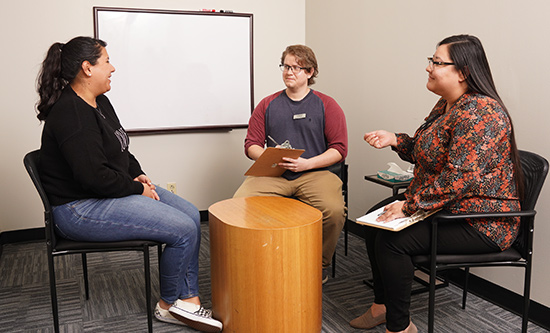
Practicum
Marriage and Family Therapy students take four semesters of practicum, which consists of intensive training in the university’s Community Counseling Service (CCS) and off-campus sites. In the CCS practicum, students participate on treatment teams under the supervision of licensed professionals and use video recording and live supervision to enhance feedback and client services. Students in off-campus practicum sites are supervised by OLLU faculty or qualified professionals.
Courses in the Marriage and Family Therapy Degree
The MS in Psychology - Marriage and Family Therapy concentration is a 60 credit hour program. It includes the following courses plus 9 credit hours in electives from approved Graduate Psychology courses.
PSYC 6380 | 3 CREDIT HOURS
Addresses research methodologies used in psychotherapy research. Data gathering and
analysis related to data-based decision making for intervention and service delivery
is addressed. The use of evidence-based practices in community organizations, and
marriage and family therapy is also covered. Students examine qualitative and quantitative
methods, evaluate and design research, and learn to translate research findings into
clinical practice.
PSYC 7333 | 3 CREDIT HOURS
Definition, description and diagnosis of mental disorders according to DSM and other
classification systems. Focus on the individual in family and cultural contexts. Will
cover the administration of mental status exams and the development of treatment plans
based on diagnostic categories.
PSYC 7351 | 3 CREDIT HOURS
Social development of the individual as a process; ecological and familial settings
for development as they interact with genetic and physiological patterns of growth
and change.
PSYC 8301 | 3 CREDIT HOURS
Focus upon understanding group process and facilitation. Review of strategies for
prevention of interpersonal and systems dysfunction utilizing communication groups,
family enrichment, parenting groups, etc.
PSYC 8303 | 3 CREDIT HOURS
Investigation of professional issues relevant to ethics, professional organizations,
family law, certification and licensure, and finance relative to practice.
PSYC 8345 | 3 CREDIT HOURS
Exploration of foundational theories of individual and systemic psychotherapeutic
approaches. Review of key concepts, techniques and therapeutic process and ethical
considerations.
PSYC 8348 | 3 CREDIT HOURS
Application of strengths-based approaches to the identification and treatment of contemporary
issues such as addictive behaviors, eating disorders, homelessness, trauma, geriatrics
and other. Course will examine evidence-based practices and practice-based evidence
for strengths-based interventions in working with individuals, couples and families
experiencing these issues.
PSYC 8351 | 3 CREDIT HOURS
Introduction to strengths based approaches to psychotherapy to work with individuals,
couples, families, and larger systems. Emphasis on solution-focused, narrative, collaborative,
and brief systemic approaches.
PSYC 8352 | 3 CREDIT HOURS
Approaches to strengths-based interviewing with families, couples, and individuals.
Special attention to the beginning stages of therapy common presenting concerns, and
utilizing client feedback. Laboratory preparation of students to begin practicum.
PSYC 8355 | 3 CREDIT HOURS
Application of systemic therapies to individual and family psychotherapy with children
and adolescents. Emphasis on cultural context and working with larger systems including
schools, child protective services, and the court system. Examines areas that frequent
need to be addressed when working with children and adolescents including family violence
and abuse, substance abuse, gang violence and bullying.
PSYC 8356 | 3 CREDIT HOURS
Familiarization with systems on a variety of levels and across a diversity of cultures.
Emphasis on the cultural and contextual aspects of normalcy. Issues in healthy family
functioning and assessment.
PSYC 8357 | 3 CREDIT HOURS
Presentation and analysis of contemporary methods in systemic therapy. Emphasis on
development of a meta-theoretical perspective in psychotherapies in general and systemic
therapies in particular.
PSYC 8359 | 3 CREDIT HOURS
Systemic approaches to working with same-sex and different-sex couples. Emphasis on
understanding sexual and gender dilemmas in sociocultural contexts. Review of research
literature on theory, assessment and treatment.
Practicum I
PSYC 8190 | 1 CREDIT HOUR (Repeated three times)
or
PSYC 8390 | 3 CREDIT HOURS
Under direct supervision of psychology faculty, students will provide psychological
services to individuals, couples, and families in the department-sponsored clinics.
Practicum II, III and IV
PSYC 8391 | 3 CREDIT HOURS
PSYC 8392 | 3 CREDIT HOURS
and
PSYC 8393 | 3 CREDIT HOURS
Placement at approved department sponsored clinics and approved community sites.
Admission Requirements
After a review of the completed admissions files, selected applicants will be invited to a group interview with psychology program faculty.NOTE: Due to limited spaces available, meeting minimum standards does not guarantee admission.
- Application (no application fee)
- An earned bachelor’s degree from a regionally accredited university with an overall grade point average of 2.50 or a 3.00 grade point average for the last 60 semester hours.
- An undergraduate GPA of at least 3.0
- Official transcripts from all regionally accredited colleges and universities where degrees were conferred.
-
At least 12 undergraduate semester hours in psychology including one course in statistics and a cumulative average of a “B” or better.
-
Two letters of recommendation not more than one year old from former instructors or employers (forms supplied by the University).
-
Submission of a satisfactory score on the Miller Analogies Test (MAT) or the Graduate Record Examination (GRE) taken within the last five years.
-
Personal statement addressing background in Psychology, expectations of the MS program, and professional goals.
- As felony convictions may limit practicum placements and the ability to obtain professional
licensure after graduation, all students who enroll in the MS program must submit
criminal background checks. A national criminal background check, no older than 6
months prior to enrolling in the MS program must be submitted by the last day of the
first semester in the program. All admissions are conditional pending the submission
of the national criminal background check.
-
Admission Deadlines
Deadlines for completing application to the Master of Science degree program are:
- Feb. 1 - Priority Application Deadline
- April 1 - Final Deadline
Upcoming Events
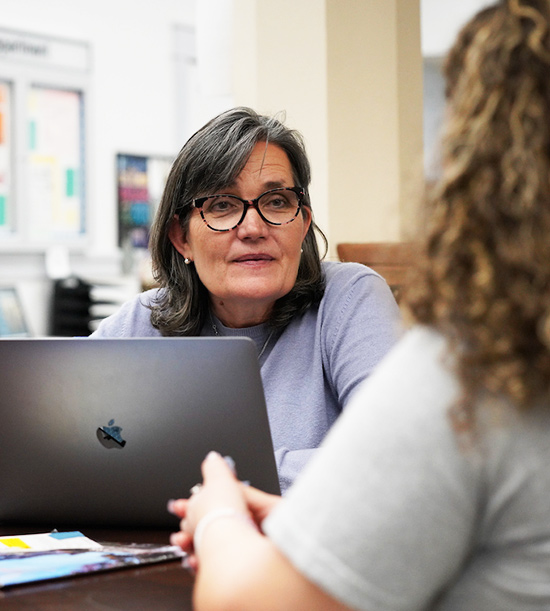
What Can You Do With a Master’s in Marriage and Family Therapy?
With a Master's in Marriage and Family Therapy, our graduates can make a meaningful difference in the lives of their clients by fostering healthier relationships, facilitating communication, and promoting emotional well-being. This degree opens up a range of career paths, each offering its unique focus and specialization within mental health and therapy, including:
- Marriage and Family Therapist
- Couples Counselor
- Family Counselor
- Child and Adolescent Therapist
- Substance Abuse Counselor
- Supervision and Consultation
- Healthcare Settings Therapist
- Nonprofit and Community Organization Counselor
Tuition & Financial Aid
The COAMFTE accredited master’s degree in Marriage and Family Therapy program opens doors to employment with the federal government and other providers of mental healthcare. As one of the few COAMFTE accredited programs in Texas, it is an investment in your career and signals the quality of the preparation that you will receive.
| Tuition | Costs |
|---|---|
| Our Tuition (2024–2025 rate) | $2,973 per three credit hour course |
| Average Tuition of Peer Online Institutions | $4,330 per course |
You should begin the Financial Aid application process at the same time that you apply to the graduate program. To be considered for financial aid, you must complete the Free Application for Federal Student Aid (FAFSA) at www.studentaid.gov . Please list Our Lady of the Lake University, federal school code #003598, as one of the schools to receive your application information. OLLU will receive your results electronically and use them to award your financial aid.
Please note: You must be officially accepted for admission to the university before a financial aid award can be processed.
FAQs
An MFT Degree is a graduate-level program that prepares students to become licensed marriage and family therapists.
In addition to the requirements for graduate admission into Our Lady of the Lake University, applicants will provide:
- Official transcripts from attended accredited universities.
- Bachelor's degree with a GPA of 2.50 (or 3.00 in the last 60 semester hours).
- 12 undergraduate semester hours in psychology, including statistics, with a "B" or better average.
- Two recent recommendation letters.
- Miller Analogies Test (MAT) or GRE scores within five years.
- Criminal background check within six months of enrollment.
- Personal statement on psychology background, program expectations, and goals.
- Complete the admission file by the deadline.
- Selected applicants attend a faculty group interview.
Our MFT degree program consists of 60 credit hours and can typically be finished within two years if a student enrolls full-time and attends classes during the fall, spring, and summer semesters.
Graduates with an MFT degree can pursue careers as licensed marriage and family therapists, working in private practice, mental health clinics, hospitals, schools, or other healthcare settings. They can also work as counselors, therapists, or consultants, specializing in helping individuals and families with relationship and mental health issues.
Graduate Achievement Data
From the American Association for Marriage and Family Therapy website
The Commission on Accreditation for Marriage and Family Therapy Education is recognized by the Council for Higher Education Accreditation (CHEA). Consistent with the CHEA Recognition Standards, accreditation organizations must establish standards that require accredited programs “to provide quality and consistent information about academic quality and student achievement and thus to foster continuing public awareness, confidence, and investment.” COAMFTE has established Accreditation Standards that require programs to report on student achievement. Additionally, COAMFTE collects student achievement data on graduation rates, exam pass rates, and licensure rates. Accredited programs are required to report student achievement criteria data on an annual basis.
Accredited programs report student achievement criteria data for each cohort in the program. A cohort is defined as the students who entered a program between a given time period (example: the students in the fall 2015-spring 2016 cohort, entered their respective programs between the fall of 2015 and spring of 2016).
Data for the Marriage and Family Therapy program shows in the 2025 Graduate Achievement Data for the San Antonio campus program document.
